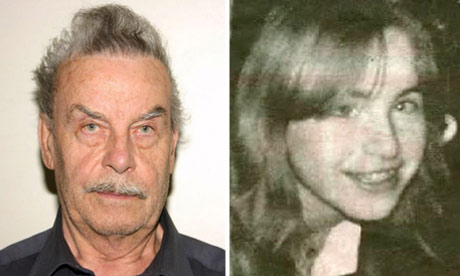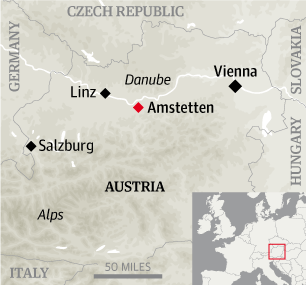- guardian.co.uk,
- Monday April 28 2008
- Article history

Josef Fritzl and Elizabeth Fritzl. Photograph: EPA
A 73-year-old Austrian today confessed to imprisoning, beating and sexually abusing his daughter in a windowless cellar for 24 years, during which time he fathered her seven children.
Josef Fritzl admitted to forcing his daughter Elisabeth into the basement of the family's home in Amstetten, north-west Austria, on August 24 1984, when she was 18.
Franz Pölzer, the head of the criminal investigations unit in the province of Lower Austria, said Fritzl had admitted abduction, incest and abuse.
Holding up a picture of Fritzl, at a press conference, Pölzer said: "This man led a double life for 24 years. He deceived everybody. He deceived his wife and the legal system."
After initially denying the crime, Fritzl later admitted locking up his daughter, beating and sexually abusing her, and fathering her seven children, Pölzer said.
"Even the most experienced members of the criminal police found it shocking."
Fritzl is expected to appear in court later today. Police released several photos showing parts of the cramped basement cell where Elisabeth and her children were kept.
It included a thick soundproofed door, a small but brightly decorated bathroom, and a narrow passageway leading to a tiny bedroom.
Earlier, a police spokesman said 42-year-old Elisabeth was "psychologically extremely disturbed", but that her version of events was "completely believable".
She claimed her father had abused her since she was 11. "In her own words, she was continuously abused by her father," the spokesman said.
She said she had borne seven children by Fritzl, including twins, one of whom died after only three days in 1996. He admitted removing the body from the cellar and burning it.
Police said many questions remained in the case, which is reminiscent of that of the Austrian girl Natascha Kampusch, who was abducted, aged 10, on her way to school in 1998 and locked in a windowless cell before escaping in August 2006.
Today, the Austrian daily newspaper Der Standard said in an editorial: "The whole country must ask itself just what is really, fundamentally going wrong."
Police said Fritzl, an electrical engineering technician by training, had told investigators how to enter the basement prison through a small hidden door, operated by a secret code which only he had known.
"There was a shelf with plenty of cans and containers, and behind the shelf was a door made of reinforced concrete, secured electronically and running on steel rails," Heinz Lenze, a local official, told Reuters.
Yesterday, Pölzer told the broadcaster ORF that there were a number of rooms in the cellar.
"There is … one room to sleep in, one to cook, and there are also sanitation facilities," he said. The APA news agency said some of the rooms in the cellar were no more than 1.7 metres (5ft 6in) high.
Fritzl's wife, Rosemarie, had been unaware of what happened to Elisabeth.
It is believed she assumed her daughter had disappeared voluntarily after a letter in her writing to her parents said they should not search for her.
The drama began to unravel last weekend when Elisabeth's 19-year-old daughter, Kerstin, who lived in the cellar, was left at a hospital with a life-threatening illness.
A search for Elisabeth increased in urgency as Kerstin's condition worsened.
The plight of the mother and children was discovered on Saturday night when Elisabeth and her father appeared together at the hospital.
They were taken to the nearby police station, where he was arrested for sexually abusing his daughter and holding her captive.
Kerstin is said to be in a critical condition, suffering from an unknown illness, in the intensive care unit of Krems hospital.
Pölzer said Elisabeth "gave the impression of being in an extremely disturbed psychological state" and was "in a bad way physically".
She had agreed to speak to police only after being assured that she and her children would never again have contact with her father.
They said it appeared that when Fritzl imprisoned his daughter in 1984, he had given the impression that she had left home of her own will. She remained on the Interpol missing persons list.
Police investigators at the time were of the view that she might have become a member of a sect.
On various occasions between 1993 and 2002, Fritzl claimed his daughter had left three children on his doorstep along with notes asking him to look after them.
Authorities gave the couple permission to become foster parents to what were assumed to be their grandchildren.
But, according to police, Elisabeth had given birth to the children, along with four others including the one that died, in her cellar prison. Her father had removed the children.
 Map: Amstetten's location in Austria
Map: Amstetten's location in Austria
Of the six children - three boys and three girls aged between five and 20 - five-year-old Felix, Stefan, 18, and Kerstin lived with their mother in the cellar. They never saw sunlight and received no education.
"She taught them how to speak," Pölzer said, adding that Josef had provided food and clothing, but the children never received any professional medical care.
DNA tests will be carried out in the next few days to confirm that Josef fathered the six children, but the spokesman said: "All indications point to the fact he did."
Forensic scientists were searching the cellar yesterday, while others combed the grounds of the house.
"There are things that you just don't want to see," a policeman at the house said. "The fewer pictures you have in your head, the better."
One neighbour said Fritzl had been "inconspicuous" and "always greeted us in a friendly way".
Another said she had often seen Rosemarie with her grandchildren. "She is really very nice, taking the grandchildren to school - but we knew nothing of what was really going on," she added.